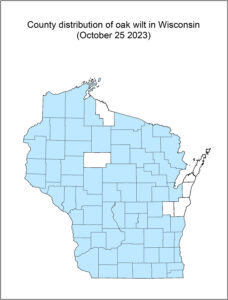
With the addition of Ashland County, oak wilt has now been detected in 66 of Wisconsin’s 72 counties. / Map Credit: Wisconsin DNR.
By Paul Cigan, DNR Forest Health Specialist, Hayward
Paul.Cigan@wisconsin.gov or 715-416-4920
Oak wilt, a deadly disease of oaks, has been found for the first time in Ashland County.
The Wisconsin Department of Natural Resources (DNR) confirmed the find in wood samples from a red oak tree in the town of Gordon.
“There is always risk of oak wilt spread into new and relatively uninfested areas in northern Wisconsin, such as Ashland County, so it’s always best to practice oak wilt prevention wherever possible to significantly reduce that risk,” said Paul Cigan, a DNR forest health specialist based in Hayward.
Oak wilt is commonly found in the southern two-thirds of the state and is creeping north. Although oak wilt has been identified in 66 of Wisconsin’s 72 counties, most of northern Wisconsin is still free of oak wilt. So, it remains important to prevent the spread of this disease.
Prevent The Spread Of Oak Wilt To Healthy Trees
Oak wilt is easily brought to new areas on firewood and other raw oak materials from infected oaks. Beetles that feed on the sap from tree wounds spread the disease from tree to tree. To prevent this:
- Avoid pruning or injuring oak trees from April through July.
- If oaks are removed, pruned or damaged between April and July, seal the wounds immediately with a water-based (latex) paint or pruning sealer.
- Keep firewood local. Leave oak firewood and uncut firewood logs where they were cut for one year, or until the bark is naturally loose.
Preventing the introduction of oak wilt to a new area is much easier than containing an infection. After a tree is infected, oak wilt spreads from one oak to another through connected roots between neighboring trees. Preventing this underground spread can be difficult and expensive.
Symptoms: What Oak Wilt Looks Like
“Symptoms of oak wilt are branches with wilted leaves and leaves on the ground in summer when you wouldn’t expect to see that,” said Cigan. “These are not the brown, dry leaves you see in autumn. These are partially green to bronze-green and are not completely dry. Once symptoms are visible, a tree loses most of its leaves and dies within a few weeks.”
More Information Is Available
The University of Wisconsin’s Plant Disease Diagnostic Clinic (608-262-2863) can help verify the presence of oak wilt. A sample must be sent to the clinic, and a small fee is charged for the service.
Additional information is available on the DNR web site covering oak wilt and firewood guidelines.
Local DNR urban forestry coordinators have information about grants to help combat oak wilt at the community level. Individual property owners may contact their municipal forester or their area’s DNR forest health specialist with their oak wilt concerns.
